-

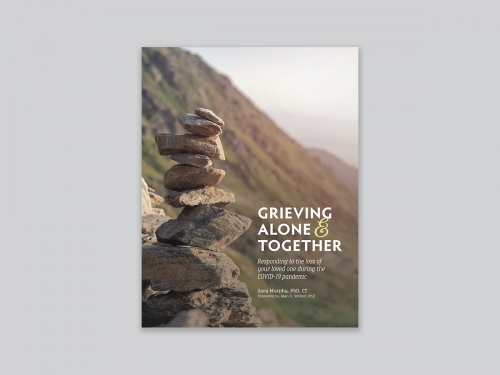 This is a free resource—simply pay shipping! The guide addresses the challenges of grieving a loved one’s death during the COVID-19 pandemic, including the nature of grief; traumatic loss and its triggers; ambiguous losses; and the risk of disenfranchised grief. It also addresses the importance of talking to children about death and memorialization and the difficulties of being separated from a loved one at the time of their death. The guide offers guidance on how families can meaningfully celebrate the life of their loved one and discusses the importance of maintaining your health while grieving.
This is a free resource—simply pay shipping! The guide addresses the challenges of grieving a loved one’s death during the COVID-19 pandemic, including the nature of grief; traumatic loss and its triggers; ambiguous losses; and the risk of disenfranchised grief. It also addresses the importance of talking to children about death and memorialization and the difficulties of being separated from a loved one at the time of their death. The guide offers guidance on how families can meaningfully celebrate the life of their loved one and discusses the importance of maintaining your health while grieving. -
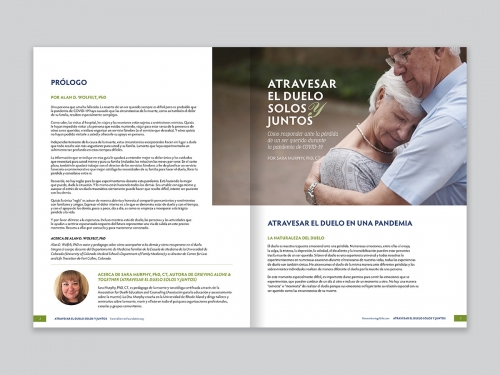
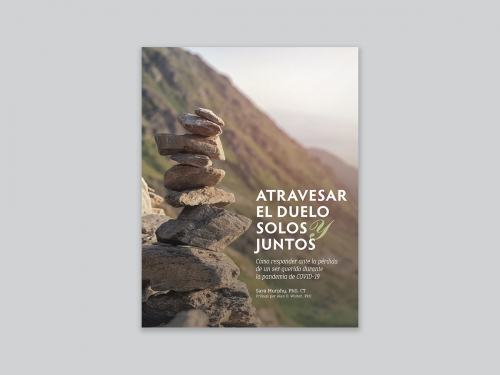 This is a free resource—simply pay shipping! Atravesar El Duelo Solos Y Juntos—Cómo responder ante la pérdida de un ser querido durante la pandemia de COVID-19 Por Sara Murphy, PhD, CT Prólogo por Alan D. Wolfelt, PhD. The guide addresses the challenges of grieving a loved one’s death during the COVID-19 pandemic, including the nature of grief; traumatic loss and its triggers; ambiguous losses; and the risk of disenfranchised grief. It also addresses the importance of talking to children about death and memorialization and the difficulties of being separated from a loved one at the time of their death. The guide offers guidance on how families can meaningfully celebrate the life of their loved one and discusses the importance of maintaining your health while grieving.
This is a free resource—simply pay shipping! Atravesar El Duelo Solos Y Juntos—Cómo responder ante la pérdida de un ser querido durante la pandemia de COVID-19 Por Sara Murphy, PhD, CT Prólogo por Alan D. Wolfelt, PhD. The guide addresses the challenges of grieving a loved one’s death during the COVID-19 pandemic, including the nature of grief; traumatic loss and its triggers; ambiguous losses; and the risk of disenfranchised grief. It also addresses the importance of talking to children about death and memorialization and the difficulties of being separated from a loved one at the time of their death. The guide offers guidance on how families can meaningfully celebrate the life of their loved one and discusses the importance of maintaining your health while grieving. -
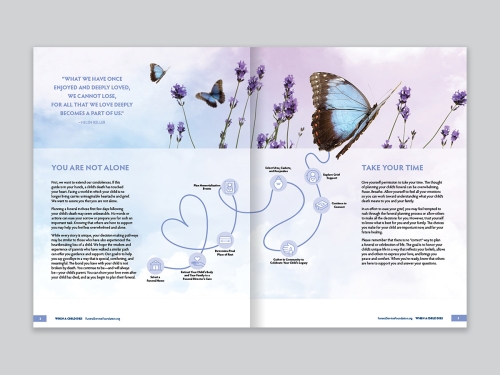
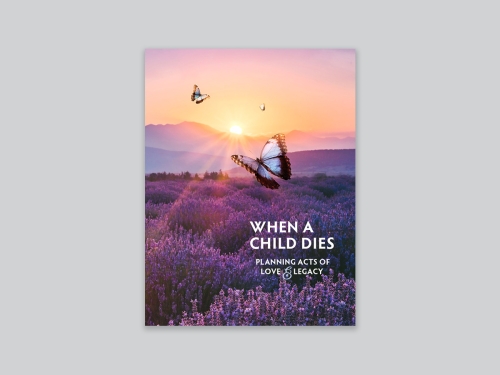 This is a free resource—simply pay shipping! As a beacon of support and compassion for families and communities, a funeral director’s role extends beyond caring for the decedent. The Foundation offers free resources to help funeral directors build strong, trusted relationships, and help families understand that they are not alone in their grief. We are here to help you answer these common questions:
This is a free resource—simply pay shipping! As a beacon of support and compassion for families and communities, a funeral director’s role extends beyond caring for the decedent. The Foundation offers free resources to help funeral directors build strong, trusted relationships, and help families understand that they are not alone in their grief. We are here to help you answer these common questions:- How do I plan a meaningful goodbye for my child?
- Should my child attend the funeral?
- Is my grief normal during a pandemic?
-
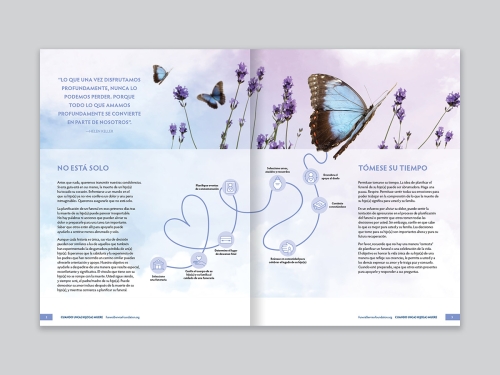
 This is a free resource—simply pay shipping! As a beacon of support and compassion for families and communities, a funeral director’s role extends beyond caring for the decedent. The Foundation offers free resources to help funeral directors build strong, trusted relationships, and help families understand that they are not alone in their grief. We are here to help you answer these common questions:
This is a free resource—simply pay shipping! As a beacon of support and compassion for families and communities, a funeral director’s role extends beyond caring for the decedent. The Foundation offers free resources to help funeral directors build strong, trusted relationships, and help families understand that they are not alone in their grief. We are here to help you answer these common questions:- How do I plan a meaningful goodbye for my child?
- Should my child attend the funeral?
- Is my grief normal during a pandemic?
-
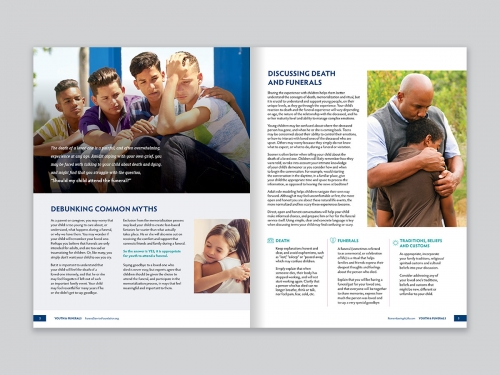
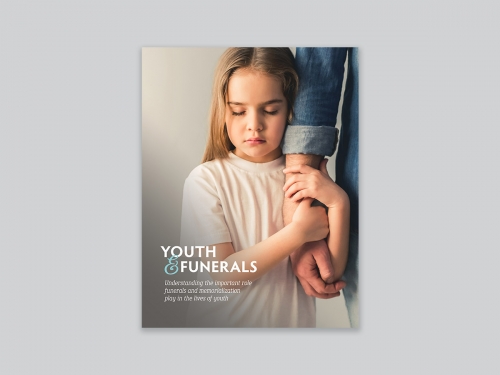 This is a free resource—simply pay shipping! The Youth & Funerals booklet is a tool that helps debunk the common myths that prevent youth from attending or participating in funerals, offers age-appropriate language and advice on discussing death and funerals with youth, and gives suggestions for youth preparedness, empowerment and involvement in memorialization.
This is a free resource—simply pay shipping! The Youth & Funerals booklet is a tool that helps debunk the common myths that prevent youth from attending or participating in funerals, offers age-appropriate language and advice on discussing death and funerals with youth, and gives suggestions for youth preparedness, empowerment and involvement in memorialization. -
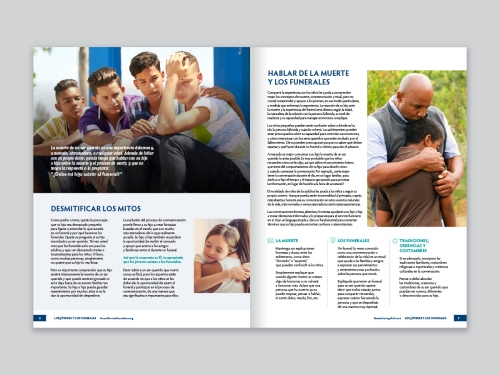
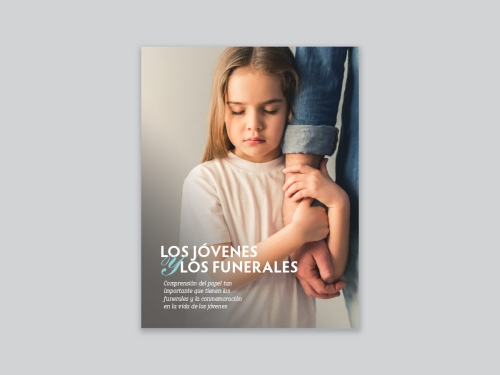 This is a free resource—simply pay shipping! Los Jóvenes Y Los Funerales — Compresión del papel tan importante que tienen los funerales y la conmemoración en la vida de los jóvenes The Youth & Funerals booklet is a tool that helps debunk the common myths that prevent youth from attending or participating in funerals, offers age-appropriate language and advice on discussing death and funerals with youth, and gives suggestions for youth preparedness, empowerment and involvement in memorialization.
This is a free resource—simply pay shipping! Los Jóvenes Y Los Funerales — Compresión del papel tan importante que tienen los funerales y la conmemoración en la vida de los jóvenes The Youth & Funerals booklet is a tool that helps debunk the common myths that prevent youth from attending or participating in funerals, offers age-appropriate language and advice on discussing death and funerals with youth, and gives suggestions for youth preparedness, empowerment and involvement in memorialization.
